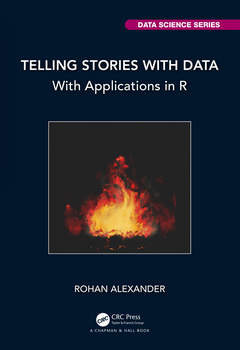Telling Stories with Data With Applications in R Chapman & Hall/CRC Data Science Series
Auteur : Alexander Rohan

The book equips students with the end-to-end skills needed to do data science. That means gathering, cleaning, preparing, and sharing data, then using statistical models to analyse data, writing about the results of those models, drawing conclusions from them, and finally, using the cloud to put a model into production, all done in a reproducible way.
At the moment, there are a lot of books that teach data science, but most of them assume that you already have the data. This book fills that gap by detailing how to go about gathering datasets, cleaning and preparing them, before analysing them. There are also a lot of books that teach statistical modelling, but few of them teach how to communicate the results of the models and how they help us learn about the world. Very few data science textbooks cover ethics, and most of those that do, have a token ethics chapter. Finally, reproducibility is not often emphasised in data science books. This book is based around a straight-forward workflow conducted in an ethical and reproducible way: gather data, prepare data, analyse data, and communicate those findings. This book will achieve the goals by working through extensive case studies in terms of gathering and preparing data, and integrating ethics throughout. It is specifically designed around teaching how to write about the data and models, so aspects such as writing are explicitly covered. And finally, the use of GitHub and the open-source statistical language R are built in throughout the book.
Key Features:
- Extensive code examples.
- Ethics integrated throughout.
- Reproducibility integrated throughout.
- Focus on data gathering, messy data, and cleaning data.
- Extensive formative assessment throughout.
1. Telling stories with data 2. Drinking from a fire hose 3. Reproducible workflows Part 1. Foundations 4. Writing research 5. Static communication Part 2. Communication 6. Farm data 7. Gather data 8. Hunt data Part 3. Acquisition 9. Clean and prepare 10. Store and share Part 4. Preparation 11. Exploratory data analysis 12. Linear models 13. Generalized linear models 14. Causality from observational data 15. Multilevel regression with post-stratification 16. Text as data 17. Concluding remarks
Dr. Rohan Alexander is an assistant professor at the University of Toronto, jointly appointed in the Faculty of Information and the Department of Statistical Sciences. He is also the assistant director of CANSSI Ontario, a senior fellow at Massey College, a faculty affiliate at the Schwartz Reisman Institute for Technology and Society, and a co-lead of the DSI Thematic Program in Reproducibility. He holds a PhD in Economics from the Australian National University with a focus on economic history.
Date de parution : 07-2023
17.8x25.4 cm
Thèmes de Telling Stories with Data :
Mots-clés :
Linear Models; R Essentials; Static Communication; Interactive Communication; Multilevel Regression; Data; Data Analysis; Online Appendix; CSV; Data Cleaning; JANE EYRE; Quarto Document; Gdp Growth; Marathon Time; Generalized Linear Models; Code Chunk; CSV File; Data Science; Supervised Machine Learning; Quick Sketch; Simulated Dataset; Vice Versa; Continuous Outcome Variable; Iowa State University; File Names; UN; Potential Dataset; Propensity Score Matching; Base R; ACS; Missing Data; Multiple Linear Regression



